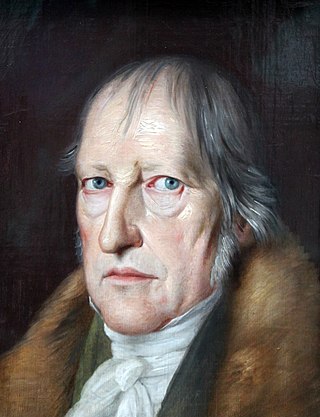
Georg Wilhelm Friedrich Hegel was a German philosopher and one of the most influential figures of German idealism and 19th-century philosophy. His influence extends across the entire range of contemporary philosophical topics, from metaphysical issues in epistemology and ontology, to political philosophy, the philosophy of history, philosophy of art, philosophy of religion, and the history of philosophy.

Immanuel Kant was a German philosopher and one of the central Enlightenment thinkers. Born in Königsberg, Kant's comprehensive and systematic works in epistemology, metaphysics, ethics, and aesthetics have made him one of the most influential and controversial figures in modern Western philosophy, being called the "father of modern ethics", "father of modern aesthetics" and, by bringing together rationalism and empiricism, the "father of modern philosophy".

Philosophy of law is a branch of philosophy that examines the nature of law and law's relationship to other systems of norms, especially ethics and political philosophy. It asks questions like "What is law?", "What are the criteria for legal validity?", and "What is the relationship between law and morality?" Philosophy of law and jurisprudence are often used interchangeably, though jurisprudence sometimes encompasses forms of reasoning that fit into economics or sociology.
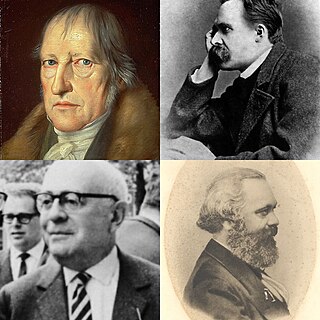
German philosophy, meaning philosophy in the German language or philosophy by German people, in its diversity, is fundamental for both the analytic and continental traditions. It covers figures such as Gottfried Wilhelm Leibniz, Immanuel Kant, Georg Wilhelm Friedrich Hegel, Karl Marx, Friedrich Nietzsche, Martin Heidegger, Ludwig Wittgenstein, the Vienna Circle, and the Frankfurt School, who now count among the most famous and studied philosophers of all time. They are central to major philosophical movements such as rationalism, German idealism, Romanticism, dialectical materialism, existentialism, phenomenology, hermeneutics, logical positivism, and critical theory. The Danish philosopher Søren Kierkegaard is often also included in surveys of German philosophy due to his extensive engagement with German thinkers.

Elements of the Philosophy of Right is a work by Georg Wilhelm Friedrich Hegel published in 1820, though the book's original title page dates it to 1821. Hegel's most mature statement of his legal, moral, social and political philosophy, it is an expansion upon concepts only briefly dealt with in the Encyclopedia of the Philosophical Sciences, published in 1817. Law provides for Hegel the cornerstone of the modern state. As such, he criticized Karl Ludwig von Haller's The Restoration of the Science of the State, in which the latter claimed that law was superficial, because natural law and the "right of the most powerful" was sufficient. The absence of law characterized for Hegel despotism, whether absolutist or ochlocracist.

Friedrich Wilhelm Joseph Schelling, later von Schelling, was a German philosopher. Standard histories of philosophy make him the midpoint in the development of German idealism, situating him between Johann Gottlieb Fichte, his mentor in his early years, and Georg Wilhelm Friedrich Hegel, his one-time university roommate, early friend, and later rival. Interpreting Schelling's philosophy is regarded as difficult because of its evolving nature.
In the 19th century, the philosophers of the 18th-century Enlightenment began to have a dramatic effect on subsequent developments in philosophy. In particular, the works of Immanuel Kant gave rise to a new generation of German philosophers and began to see wider recognition internationally. Also, in a reaction to the Enlightenment, a movement called Romanticism began to develop towards the end of the 18th century. Key ideas that sparked changes in philosophy were the fast progress of science, including evolution, most notably postulated by Charles Darwin and Jean-Baptiste Lamarck, and theories regarding what is today called emergent order, such as the free market of Adam Smith within nation states, or the Marxist approach concerning class warfare between the ruling class and the working class developed by Karl Marx and Friedrich Engels. Pressures for egalitarianism, and more rapid change culminated in a period of revolution and turbulence that would see philosophy change as well.
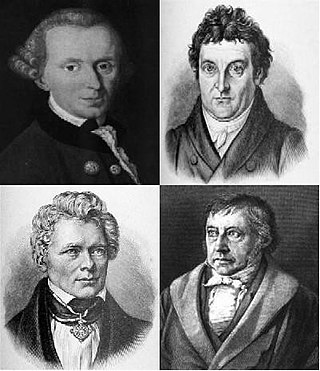
German idealism is a philosophical movement that emerged in Germany in the late 18th and early 19th centuries. It developed out of the work of Immanuel Kant in the 1780s and 1790s, and was closely linked both with Romanticism and the revolutionary politics of the Enlightenment. The period of German idealism after Kant is also known as post-Kantian idealism or simply post-Kantianism. One scheme divides German idealists into transcendental idealists, associated with Kant and Fichte, and absolute idealists, associated with Schelling and Hegel.
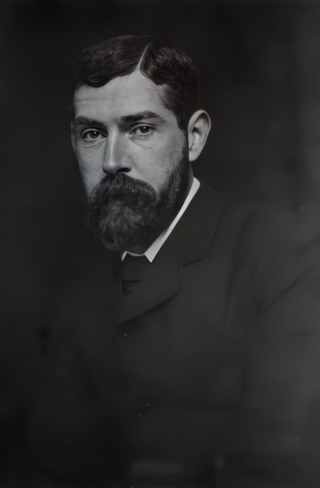
Francis Herbert Bradley was a British idealist philosopher. His most important work was Appearance and Reality (1893).
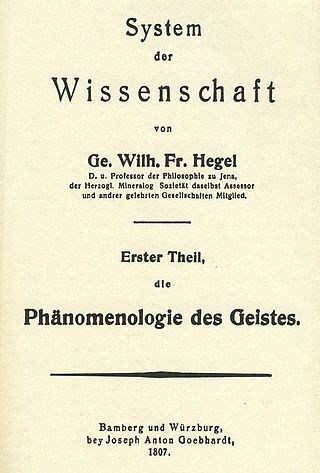
The Phenomenology of Spirit is the most widely-discussed philosophical work of Georg Wilhelm Friedrich Hegel; its German title can be translated as either The Phenomenology of Spirit or The Phenomenology of Mind. Hegel described the work, published in 1807, as an "exposition of the coming to be of knowledge". This is explicated through a necessary self-origination and dissolution of "the various shapes of spirit as stations on the way through which spirit becomes pure knowledge".

Wilhelm Dilthey was a German historian, psychologist, sociologist, and hermeneutic philosopher, who held G. W. F. Hegel's Chair in Philosophy at the University of Berlin. As a polymathic philosopher, working in a modern research university, Dilthey's research interests revolved around questions of scientific methodology, historical evidence and history's status as a science. He could be considered an empiricist, in contrast to the idealism prevalent in Germany at the time, but his account of what constitutes the empirical and experiential differs from British empiricism and positivism in its central epistemological and ontological assumptions, which are drawn from German literary and philosophical traditions.
Modern philosophy is philosophy developed in the modern era and associated with modernity. It is not a specific doctrine or school, although there are certain assumptions common to much of it, which helps to distinguish it from earlier philosophy.

Absolute idealism is chiefly associated with Friedrich Schelling and G. W. F. Hegel, both of whom were German idealist philosophers in the 19th century. The label has also been attached to others such as Josiah Royce, an American philosopher who was greatly influenced by Hegel's work, and the British idealists.

In late modern continental philosophy, neo-Kantianism was a revival of the 18th-century philosophy of Immanuel Kant. The neo-Kantians sought to develop and clarify Kant's theories, particularly his concept of the thing-in-itself and his moral philosophy.

Kantian ethics refers to a deontological ethical theory developed by German philosopher Immanuel Kant that is based on the notion that "I ought never to act except in such a way that I could also will that my maxim should become a universal law.” It is also associated with the idea that “[i]t is impossible to think of anything at all in the world, or indeed even beyond it, that could be considered good without limitation except a good will." The theory was developed in the context of Enlightenment rationalism. It states that an action can only be moral if it is motivated by a sense of duty, and its maxim may be rationally willed a universal, objective law.
An individual is that which exists as a distinct entity. Individuality is the state or quality of living as an individual; particularly of as a person unique from other people and possessing one's own needs or goals, rights and responsibilities. The concept of an individual features in diverse fields, including biology, law, and philosophy. Every individual contributes significantly to the growth of a civilization. Society is a multifaceted concept that is shaped and influenced by a wide range of elements, including human behaviors, attitudes, and ideas. The culture, morals, and beliefs of others as well as the general direction and trajectory of the society can all be influenced and shaped by an individual's activities.
Douglas Moggach is a professor at the University of Ottawa and life member of Clare Hall, Cambridge. He is Honorary Professor of Philosophy at the University of Sydney, and has held visiting appointments at Sidney Sussex College and King's College, Cambridge, the Centre for History and Economics, Cambridge, Queen Mary University of London, the Scuola Normale Superiore di Pisa., and the Fondazione San Carlo di Modena,where he taught a graduate seminar in Italian on German Idealism. Moggach has also held the University Research Chair in Political Thought at the University of Ottawa. In 2007, he won the Killam Research Fellowship awarded by the Canada Council for the Arts. He was named Distinguished University Professor at University of Ottawa in 2011.
Allen William Wood is an American philosopher specializing in the work of Immanuel Kant and German Idealism, with particular interests in ethics and social philosophy. One of the world's foremost Kant scholars, he is the Ruth Norman Halls professor of philosophy at Indiana University, Ward W. and Priscilla B. Woods Professor, emeritus, at Stanford University, and has held professorships and visiting appointments at numerous universities in the United States and Europe. In addition to popularising and clarifying the ethical thought of Kant, Wood has also mounted arguments against the validity of trolley problems in moral philosophy.
The following is a list of the major events in the history of German idealism, along with related historical events.
Terry P. Pinkard is an American philosopher. He is a University Professor at Georgetown University. His research and teaching focus on the German tradition in philosophy from Kant to the present.












